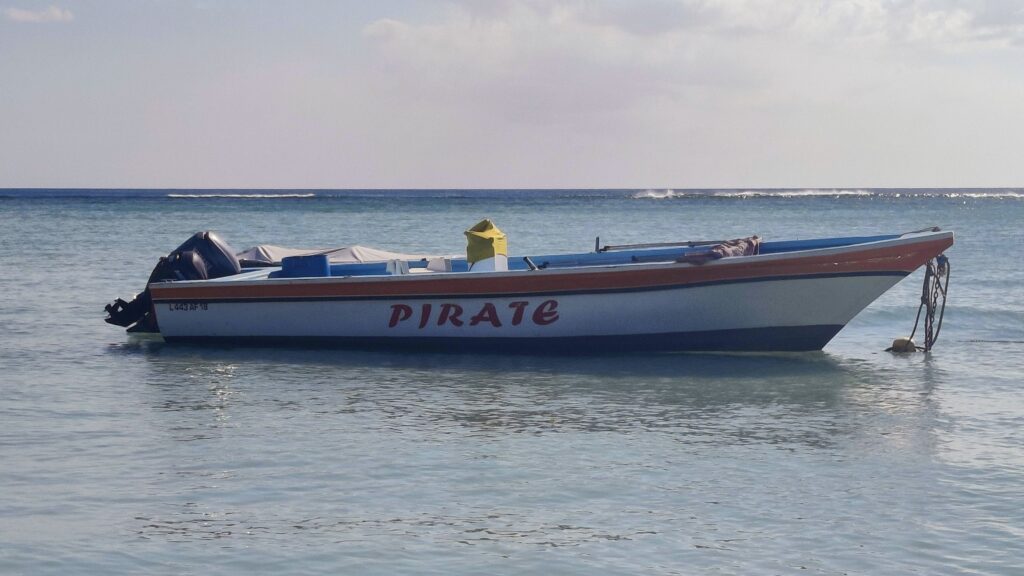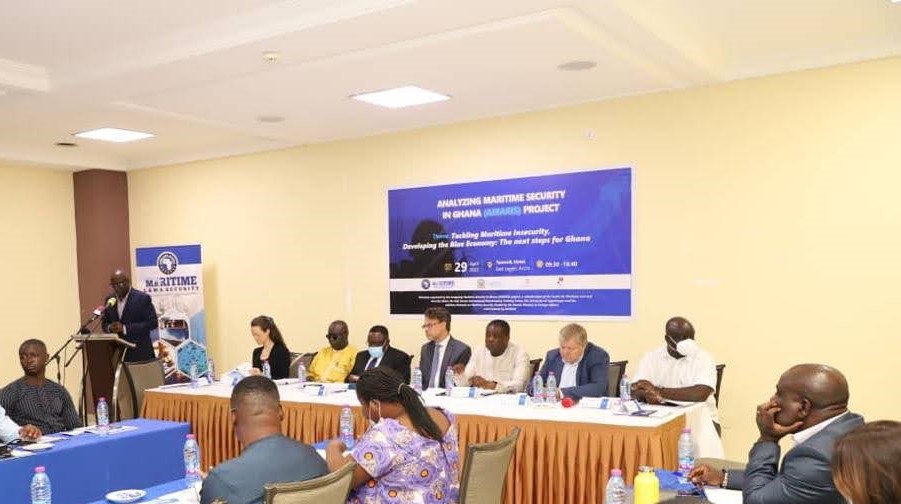The negative impacts of maritime insecurities on development, trade and human security are increasingly recognised. What are the effects of current responses to maritime insecurity? How can countries with high levels of maritime insecurity be better supported? To answer these questions, the research project Analyzing Maritime Insecurity in Ghana (AMARIS) studied maritime crime and maritime security policy in Ghana from 3/2020-9/2022.
AMARIS conducted one of the first in-depth case studies of a country’s response to maritime insecurity. It investigates the manifestations of maritime crime in Ghana and the drivers and inter-sections and studied the governance and capacity building response to them. AMARIS was implemented by the Department of Political Science, University of Copenhagen, in close cooperation with SafeSeas and partners in Ghana and was funded by the Ministry of Foreign Affairs of Denmark and administered by the Fellowship Centre of the Danish Development Agency (DANIDA).
Objectives
The goal of AMARIS was to conduct a theory-driven and in-depth study of maritime security in Ghana. It investigated the manifestations of maritime crime in the country (work package 1), the governance responses to maritime security that have developed in the past twenty year (work package 2), and the capacity building assistance that was carried out in the country by international partners (work package 3).
Ghana was seen as a paradigmatic case because it is a country in the Global South that can successfully govern its waters. The research revealed best practices, but also the tensions and challenges that persist. Theoretically the project drew on practice theory and specifically, assemblage thinking. Part of the project was to build capacity and advance research expertise in the Western African region.

Despite the challenges of the global pandemic, all project participants met in 12 quarterly online meetings, and three in person events ( 2 interpretations workshops and an outreach conference). The three work packages led to substantial achievements across the integrated fields of research:
Blue Crime
Maritime piracy is the blue crime that often receives the majority of attention. Indeed, piracy in the Gulf of Guinea continues to dominate much of the news coverage of the region. Yet, blue crime is a wider problem. Environmental crimes, such as illegal fishing or waste dumping, port security, smuggling or stowaways are issues that also require consideration.
The first work package of AMARIS investigated the manifestations of blue crime in Ghana to identify patterns, inter-sections between crimes and the core drivers behind them. This work package was led by the Kofi Annan International Peacekeeping Training Center (KAIPTC).
⌘ The main output was a detailed mapping of blue crimes in the waters under the countries jurisdiction and an investigation of hot spots of insecurity.
Maritime Security Governance
Responding to maritime insecurities is a major inter-agency challenge in which not only different governmental agencies play a role, but also private actors and coastal communities. Deciphering this complexity and understanding how the relations between actors are arranged and governed was the ambition of work package 2 of AMARIS.
Particular attention was paid to coordination tools such as maritime surveillance, coordination committees as well as maritime security strategies. Led by the Center for Maritime Security and Law in Africa (CEMLAWS), the work package provided one of the first studies of a national maritime security governance system in the Global South.
⌘ The research led to a detailed mapping of Ghana’s maritime security sector and conclusions on inter-agency coordination and the role that national strategies can play.
Capacity Building
Many countries that are negatively affected by maritime insecurity struggle with developing the appropriate capacities to effectively respond. In consequence, many international donors are assisting these countries through capacity building projects. Ghana is no exception to this.
The goal of the third work package of AMARIS was to study the challenges that emerge in capacity building as they concern power relations, coordination problems and sustainability issues. The work package is led by the University of Copenhagen, supported by the University of Ghana.
⌘ The project demonstrated the diversity of dynamics that make capacity building in practice a difficult affair. In particular the project showed how international power constellations interfere with effective capacity building delivery.
Future areas of research
AMARIS demonstrated why maritime security is vital in a countries development. In practice maritime security is however difficult to achieve, not only because of the stickiness of maritime crimes, but also the complexity of local, national, and international actors involved.
🔍 The results of AMARIS will inform future comparative research that shows how different tools and approaches, such as local expertise, maritime security strategies and different forms of capacity building work and allow to overcome the multitude of operational, strategic, and political maritime security challenges.
🔍 AMARIS is also a great demonstration that research on maritime security in the Global South is best driven by research teams that closely integrate local and international expertise. Too often maritime security studies research is driven by research in the universities of the Global North with a lack of contextual insights and too little efforts to translate research and build up expertise in the Global South.
⧭ AMARIS also pathed the ground for a follow up project on counter-piracy in the Gulf of Guinea region, funded by the Danish Ministry of Foreign Affairs and administered by DANIDA, assisted in the writing up of a major monograph on maritime security and spurred important work on the integration of maritime security and the blue economy.

Overview of Outputs: Policy Briefs and Project Reports
- Policy brief – Developing A Comprehensive National Integrated Maritime Strategy: The Case of Ghana, 7.6.2022, https://www.safeseas.net/how-to-improve-the-delivery-of-capacity-building-insights-from-a-coordination-meeting/
- Workshop report – Maritime Security in Ghana – The Next Steps, 22.4.2022, https://www.safeseas.net/maritime-security-in-ghana-the-next-steps/
- Policy brief – Maritime Insecurity in the Gulf of Guinea: Ghana’s Actual Maritime Crime Picture, 30.11.2021, https://www.safeseas.net/maritime-insecurity-in-the-gulf-of-guinea-ghanas-actual-maritime-crime-picture/
- Policy brief – Negotiating Capacity Building: The case of maritime security projects in Ghana, 16.11.2021, https://www.safeseas.net/policy-brief-negotiating-capacity-building-the-case-of-maritime-security-projects-in-ghana/
- Policy brief – “Simplifying Complexities: Interagency Coordination in Ghana’s Maritime Security Governance”, 28.6.2021, https://www.safeseas.net/policy-brief-simplifying-complexities-interagency-coordination-in-ghanas-maritime-security-governance/ and https://cemlawsafrica.org/simplifying-complexities/
- Meeting – Project meeting, 13.3.2021, https://www.safeseas.net/maritime-security-in-ghana-amaris-holds-project-meeting/
- Video – The Limits of Capacity Building, 12.3.2021, https://www.safeseas.net/the-limits-of-capacity-building-new-video/
- Presentation – How Academia contributes to Capacity Building, G7++ Meeting, 4.12.2020, https://www.safeseas.net/presentation-at-g7-meeting/
- Commentary – How to improve the delivery of capacity building? Insights from a coordination meeting, 30.4.2020, https://www.safeseas.net/how-to-improve-the-delivery-of-capacity-building-insights-from-a-coordination-meeting/
Academic Outputs
- Agyekum, Humphrey Asamoah. 2024. Tackling Maritime Security in the Gulf of Guinea: Interactions Between Global Shipping and Ghanaian State Agents, African Security, https://doi.org/10.1080/19392206.2024.2379186
- Agyekum, Humphrey Asamoah, Ali, K., Bueger, Christian & Larsen , S. L., 2024. Maritime security and the inter-agency challenge: the case of Ghana, African Security Review, in print.
- Bueger, Christian & Edmunds, T. 2024. Understanding Maritime Security, Oxford: Oxford University Press.
- Bueger, Christian & Edmunds, T. 2024. The European Union’s quest to become a global maritime security provider, Naval War College Review 76(2): article 6, 2023 (with Tim Edmunds), https://digital-commons.usnwc.edu/nwc-review/vol76/iss2/6 [open access].
- Bueger, Christian & Mallin, F. 2023. Blue Paradigms. Understanding the intellectual revolution in global ocean politics. International Affairs, 99(4): 1719–1739, 2023, doi: 10.1093/ia/iiad124.
- Jacobsen, Katja Lindskov, 2022. The Politics of Piracy Numbers: The Gulf of Guinea Case. Routledge Handbook of Maritime Security. Boşilcă, R-L., Ferreira, S. & J. Ryan, B. (eds.). London: Taylor & Francis, p. 127-138, https://www.taylorfrancis.com/chapters/edit/10.4324/9781003001324-13
- Bueger, Christian. 2022. Pragmatic spaces and the maritime security agenda, in “The Handbook of Ocean Space“, edited by Jon Anderson, Andy Davies, Kimberly Peters and Philip Steinberg, Routledge, 179-189, doi: 10.4324/9781315111643-19.
- Bueger, Christian & Liebetrau, Tc. 2022. Maritime Security in the Atlantic: the Vulnerabilities of Subsea Data Infrastructure, in: Shifts in World Geopolitics: Cooperation and Competition in the Atlantic, Portuguese Ministry of Defense, Atlantic Center for Defence Capacity Building, IDN E-Briefing Papers | May 2022, 34-42, https://www.defesa.gov.pt/pt/pdefesa/ac/pub/acpubs/Documents/IDN_E-briefing-Paper_MAI22.pdf
- Bueger, Christian. 2021. Shifting Tides: The Blue Economy and Concepts in Practice, in “Concepts at Work: On the linguistic infrastructure of world politics”, edited by Piki Ish-Shalom, Ann Arbor: Michigan University Press, 137-156.
- Bueger, Christian. 2021. Does Maritime Security Require a New United Nations Structure? Global Observatory, 26.8.2021, https://theglobalobservatory.org/2021/08/does-maritime-security-require-a-new-united-nations-structure/
- Bueger, Christian & Larsen, J. 2020. Maritime Insecurities, in “The Routledge Handbook of Peace, Security and Development”, edited by Fen Osler Hampson, Alpaslan Özerdem, and Jonathan Kent, Routledge, 149-163, 2020, doi: 10.4324/9781351172202-15.
- Bueger, Christian, Edmunds, T. & McCabe, R. 2020. Into the Sea: Capacity Building Innovations and the Maritime Security Challenge, Third World Quarterly 41(2): 228-246, doi: 10.1080/01436597.2019.1660632.
- Bueger, Christian. 2019. Maritime Security and the Capacity Building Challenge: Introducing the SafeSeas Best Practice Toolkit. Seychelles Research Journal 1(2): 149–56, 2019.
Further Information
For further information and details contact Christian Bueger at christian.bueger@ifs.ku.dk
